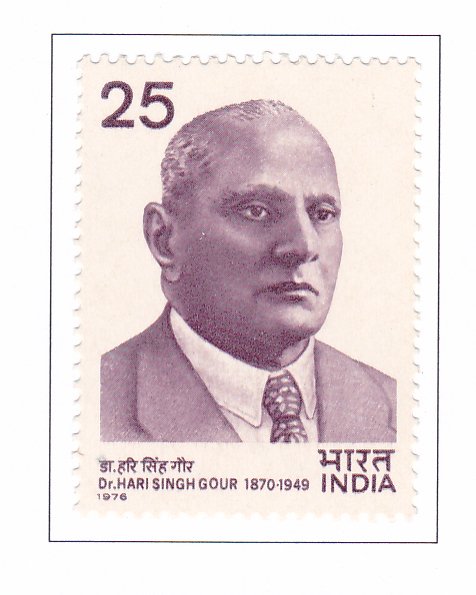Dr. Hari Singh Gour (1870-1949) Commemoration

Technical Data
| Date of Issue | November 26, 1976 |
|---|---|
| Denomination | 25 p |
| Quantity | 3,000,000 |
| Perforation | comb 13 |
| Printer | Security Printing Press, Nashik |
| Watermark | No Watermark |
| Colors | Deep red purple |
| Catalog Codes |
Michel IN 700 Stamp Number IN 743 Yvert et Tellier IN 502 Stanley Gibbons IN 833 |
| Themes | Authors | Commemoration | Famous people | Jurists | Literary People (Poets and Writers) | Literature | Men | Reformers |
Dr. Hari Singh Gour, born on November 26, 1870, into a humble peasant family near Saugar, faced early financial struggles that were mitigated by his elder brother’s support. Despite financial constraints, Hari Singh’s scholarly aptitude shone through when he won a scholarship at the age of 10, enabling him to attend a night school in Saugar. Subsequently, he pursued further studies with the assistance of another scholarship, ultimately excelling in his intermediate examination from Hislop College, Nagpur, ranking first in the whole province.
At the age of 18, Hari Singh embarked on a remarkable journey by traveling to Cambridge University, where he pursued Moral Sciences Tripos and Law Tripos. His time in England not only honed his legal acumen but also showcased his literary prowess, earning him recognition as a promising poet in literary circles.
Upon his return to India, Hari Singh Gour established himself as a successful lawyer in Raipur, authoring two monumental works, “The Law of Transfer in India” and “The Penal Law of British India,” which solidified his reputation as a jurist of exceptional caliber. His advocacy extended beyond legal realms, as evidenced by his efforts as a social reformer, advocating for women’s enrollment as lawyers and championing civil marriage reform.
Driven by determination, industry, and oratory skills, Dr. Hari Singh Gour ascended to prominence in the political arena, assuming leadership roles in the Opposition and the Nationalist Party in the Indian Legislative Assembly. He further contributed to nation-building as a Member of the Constituent Assembly entrusted with framing India’s Constitution.
Beyond his legal and political endeavors, Dr. Gour made significant contributions to education. He played instrumental roles in organizing Delhi University as its first Vice-Chancellor and serving successive terms as Vice-Chancellor of Nagpur University. Notably, he founded the University of Saugar in 1946, making a generous donation and serving as its first Vice-Chancellor until his passing on December 25, 1949.
Dr. Hari Singh Gour’s philanthropy extended beyond his lifetime, with a substantial portion of his life savings bequeathed to the University of Saugar. The university’s new campus, situated atop Patharia Hills, stands as a testament to his vision and generosity, providing future generations with a beacon of educational excellence.
In recognition of his multifaceted contributions to law, politics, and education, the Posts and Telegraphs Department is honored to issue a commemorative stamp in tribute to Dr. Hari Singh Gour.
